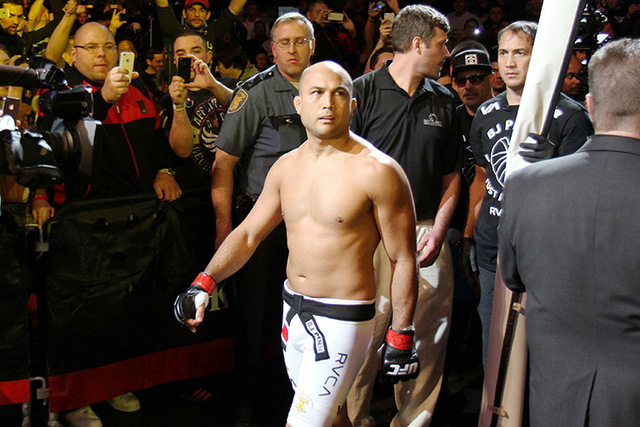Process may explain delay in BJ Penn suspension announcement

There could be a logical explanation for the time lapse from BJ Penn’s admitted use of an IV in March to the announcement of his provisional suspension on Monday.
Eyebrows were raised when Ultimate Fighting Championship officials revealed Monday the Hall of Fame fighter had been removed from a fight against Cole Miller less than two weeks before the bout was to take place, even though he had informed a sample collector he had used an IV, which is banned under the organization’s anti-doping policy, on March 25.
By contrast, Lyoto Machida had been pulled from his fight last month less than a week after acknowledging his use of a banned substance to a collector.
While he was careful to stress his comments were not about Penn specifically, UFC Vice President of Health and Development Jeff Novitzky explained to the Review-Journal on Wednesday there is a procedural step in the policy that could explain differences in time between an admission and the issuance of discipline under the policy, which is independently administered by the United States Anti-Doping Agency.
While the use of IVs was banned except in certain medical circumstances on Oct. 1, Novitzky said an athlete can either seek a therapeutic use exemption before being administered an IV or request one afterward.
“There is a process called a retroactive TUE, which would allow an athlete to go back and say, ‘Hey, I made a mistake by not submitting my TUE (ahead of time), but here’s my records showing I really did need this medically,” Novitzky said. “Generally, an athlete could be afforded that process where they could go back to their doctor and show why there was a medical need for it.”
Penn did not immediately respond to a request for confirmation of whether he had requested a retroactive TUE.
Novitzky said any such request would have been thoroughly vetted. Again, he stressed his comments were about the process in general and was not referring specifically to Penn’s case.
“Once that’s submitted, it goes to a TUE committee that USADA has, a group of experts and medical doctors that look at the application to determine whether or not there was a medical need,” he said. “So both of those things, putting together the request and then the committee reviewing it, can be a matter of weeks or, in extreme cases, months.”
It was nearly two months from the time Penn admitted he had used an IV until a notice of a potential violation of the anti-doping policy was announced.
He issued a statement on his website Monday shortly after UFC officials announced he would not fight Cole Miller at UFC 199 on June 4 in Inglewood, California.
“I voluntarily disclosed to USADA that during a nonfight period that I had an IV administered under the care of a doctor,” wrote Penn, who was attempting a comeback after retiring for the second time in 2014. “The rule for IV usage had changed since my last fight in the UFC, and (I) was unaware of the change and voluntarily disclosed the information to USADA. I had no idea that IV use was banned 365 days a year. At no time in my career in martial arts have I ever doped, and (I) anticipate all test results from USADA will come back clean and will be working with the UFC to get the matter cleared up and return to fight as soon as possible.”
According to USADA, IV usage was banned not only to prohibit fighters from relying on the method to rehydrate quickly after severe weight cuts but also because of their role in doping.
“It is a fact that IVs can be used to change blood test results (such as hematocrit, where EPO or blood doping is being used), mask urine test results (by dilution) or by administering prohibited substances in a way that will more quickly be cleared from the body in order to beat an anti-doping test,” a statement from USADA read.
The policy bans all infusions of more than 50 mL except those “legitimately received in the course of hospital admissions, surgical procedures or clinical investigations,” without an approved TUE.
Penn, 37, insists he will still attempt a return to competition after serving whatever disciplinary action is handed down by USADA.
Alex Caceres will step in for Penn to face Miller at UFC 199, UFC officials confirmed Wednesday.
Contact reporter Adam Hill at ahill@reviewjournal.com or 702-224-5509. Follow him on Twitter: @adamhilllvrj












